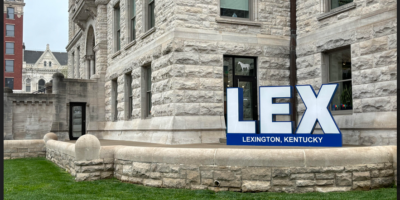Building a basil economy
By Danny Mayer
A recent survey by students in a UK rural sociology class found that most customers of the Lexington Farmers Market (LFM) come from wealthy and educated households.
The survey, which included over 500 responses, took place over two weeks at the three LFM locations: under the Fifth Third Pavilion at Cheapside and in the parking lots of Southland (Sundays) and Rupp Arena (Tuesdays and Thursdays). Nearly sixty percent of respondents at the market reported a household income greater than $50,000, a figure almost five thousand dollars more than Lexington’s median ($45,500). A little over sixty-five percent held at least a bachelor’s degree.
As a Lexington resident, the survey’s findings trouble me. This city has a strong food community, the result of a limited but hardworking bunch of public gardeners, suburban growth (which provides space for growing) and a city population not too far removed from rural life. Our city leaders have done a good job in calling attention to the wonders of locally grown food, but as the survey of the Lexington Farmer’s Markets suggests, once again they have not done a good job of granting the entire city access to such food.
One of the city’s recent signature construction projects, the Fifth Third shelter at Cheapside is often cited as an accelerate of the city’s downtown farmer’s market growth, and correspondingly, as an excellent example of city/private partnerships contributing to a community good. This is partly true. I’m a regular supporter of the downtown market–market day purchases provide a great percentage of my food needs for the week. I love the walk. I love seeing vendors. I love the music and the kids and watching Shane Tedder pedaling for shakes.
But under that rosy story, the survey of the Lexington Farmer’s Market exposes real questions about who gets access to that well-funded, well-supported market. Here I’m somewhat of an anomaly. Most of the city relies upon cars for regular travel. A downtown market, located away from most residential homes, privileges those who can drive in and out of the city: usually (by which I mean statistically), this means more wealthy, more educated folks. (In this sense, city markets also reinforce Lexington car culture, something city leaders claim to want to minimize.)
As with the rest of city development, most city residents have been left out of the farmer’s market zeitgeist, in part because no markets have located nearby them. This should be seen, in part, as a warning that not all small-scale local private sector initiatives, universally lauded across the country (and here in Lexington) these past five years, benefit communities equally.
One way to address the problem of access to food markets would be for the city to allow, encourage, and if necessary, organize small weekly farmer’s markets at its parks located throughout the city. Instead of reflexively thinking of centralizing into the urban core, the city should focus its efforts on decentralizing citizen access to markets. Go where we live.
Such markets would not supplant the downtown market, but rather provide new markets on new days at new times. This also might have the byproduct benefit of getting Lexingtonians to see and interact with their city and its citizens, rather than always having to go downtown for their cultural and culinary needs.
Maximizing Park Yields
We mostly think of parks as sites of leisure, as places to play or picnic or explore. These are all wonderful and needed things to do, but we should ask that our public parks be more productive than simply providing leisure space.
Lexington has a diverse number of parks situated throughout the city. Big ones like Veterans, rural ones like Raven’s Run, small urban ones like Duncan Park and slightly larger suburban ones like River Hill. Such places could either host weekly markets or be used as rent-free acreage to grow food for such markets.
Using our parks as market and agricultural spaces has a number of benefits. For one, markets are the easiest way to encourage small scale business development. Most small business owners have small volume and profit margins. They do not need, initially, the added expense of renting a space–particularly agricultural merchants whose business space is often their tended garden or field. By encouraging, for example, five new markets to open up around the city at its parks, we are also encouraging small scale enterprise as producers and vendors get access to new markets without having to pay for location.
It is the cheapness of the markets that also allows them to be set up in less-profitable areas. In the northside, for example, the private sector food industry has failed the neighborhood as it has followed profitability out toward other (mostly southside) locations. By having, say, Tuesday night markets at Duncan Park (North Limestone and Fifth), sellers can tap into a market without having to commit all of their resources to that space. Maximizing our parks thus potentially helps curtail the destructive needs of the private sector to chase money rather than people.
Short term, long term
Most importantly, I see the development of a series of small farmer’s markets as a matter of justice, as a way for a greater number of citizens to have access to fresh food, but I am not naive. Markets need time to grow. They need support. It is the government’s responsibility to provide such support.
I propose the creation of five weekly markets that take place Mondays through Fridays in the early evening, perhaps between 4:00 and 7:00 P.M., when most Lexingtonians are in the process of returning home from work or school for dinner. Though times may vary according to location, the ideal is to provide neighborhood residents a regular time and place to do their shopping. Markets need not be large–2-3 vendors should do at first until market participation exceeds that capacity, which may never happen.
Since Lexington’s farmer’s markets currently do not attract a diverse demographic, the city should pay attention to choosing the locations for any park-markets. My own ideas, developed mainly through observation, are that Duncan Park, Shillito Park and River Hill Park are possible locations: visible, well-used and not far from large parts of Lexington’s population. I’m sure there are many others. Market locations could be determined by neighborhood needs, or neighborhood resources. Kitchen Gardener’s John Walker, for example, lives nearby Cardinal Valley and might be cajoled into helping organize a market in that neighborhood.
Long term, the city must direct steady funds to support continued market growth. Perhaps a percentage of money the city provides for purchasing rural development rights could be diverted into providing regular seed money to underwrite the city’s entrance into the local food market. This might include helping to organize small buying collectives, so that backyard growers can pool their resources and sell produce to the markets. (In essence, this is making your house a more productive, efficient, economic space. Will you specialize in blueberries? Basil? Beans? Pepper relish?) I would also think that the city could rip up some of its grassy parkland and commit to creating a more specialized class of city farmers working public land. It happened pretty quickly during the 1940s Victory Gardens. What are city leaders waiting for?
This part will cost money initially (though astronomically less than any Rupp Arena renovations or Distillery District funding), but will ultimately prove economically smart. The city has a market advantage in that its farmers won’t have to pay rent on the land.
In terms of future market development, my friends at the Co-Op tell me that they can’t keep local produce in their store. It flies off the shelf. As oil costs rise, it seems the price of a Kroger tomato has gotten closer to the price of a Co-Op tomato. Markets for food do exist–our bellies cannot be outsourced. If the private sector complains, respond thusly: “Fuck you. We ensure that all citizens have access to food markets; you failed in that responsibility. Our concern is feeding people who are currently going hungry.”
The long term goal should be to decentralize our farmer’s markets, to quit lavishly supporting “big” markets and to emphasize the development of more small-scale growers and sellers, buttressed by city supported farming. The city needs to create a diverse network of growers–from backyard dabblers to five acre farmers–that are both publicly (at the large scale) and privately (at the small scale) funded. Ultimately, the city should think of itself as encouraging the transition of Lexington’s suburban layouts of big, sprawling lots, into places that can produce money through agricultural production. Subsidize the planting of produce not lawns. The vision is not cutting edge creative so much as it is old-world immigrant. (Who knew–creatives don’t have all the solutions…)
Now what: Playing politics
The city has a large incoming group of council members who care passionately about their district and city parks. The vice-mayor previously sat on the parks advisory board. New at-large councilman Steve Kay has been involved in the private/public London Ferrell Garden on Third Street. Incoming District One councilman Chris Ford’s work in affordable housing undoubtedly has run upon issues of food access. Jay McCord and Tom Blues have long offered support for developing and improving public parks. George Myers’ council page features a photo of him helping dig holes for River Hill Park’s new children’s playground.
We hope that these councilpersons will work together to provide low cost amenities for their constituents. Such thinking, of course, might fly in the face of private sector mythology, and it might not draw the same “wow” factor of a new sports/arts/entertainment district, but it will be much more valuable to the community.
For our part, I will offer up one large business card size space of free advertising in North of Center, every issue, should our city leaders decide to expand it to the rest of the city. And I will provide produce and vendor help for anyone wanting to start a market at Duncan Park, whether the city endorses such an action or not.




Leave a Reply